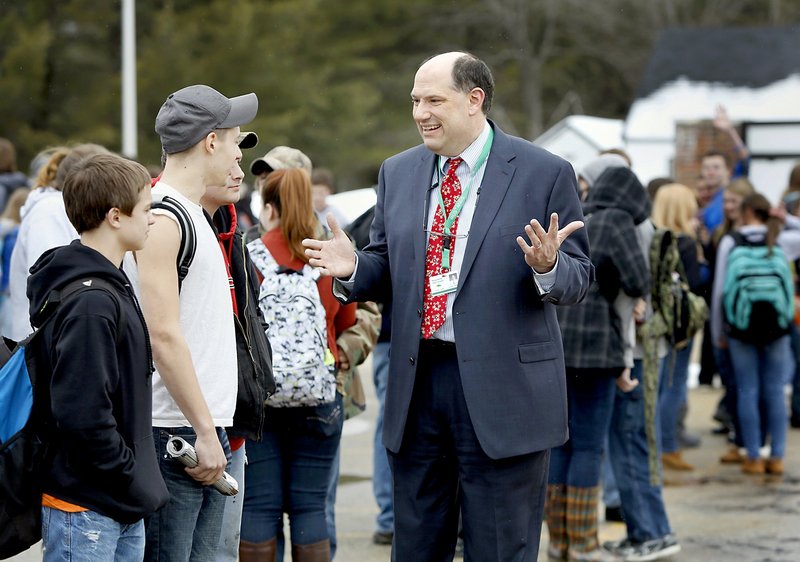Four southern Maine high schools are in the market for a new top administrator, after three principals resigned last month and another didn’t get her contract renewed.
None of the departures is due to retirement, relocation or wrongdoing.
The Bonny Eagle High School principal didn’t have the leadership skills to do the job, her superintendent said. The Scarborough principal couldn’t meet his family obligations.
Biddeford’s principal gave “personal reasons” as his only explanation for resigning, and the South Portland principal gave no reason at all.
Is something about the job causing the high rate of turnover? While the individual reasons may vary, recent studies say being a principal is more demanding than ever, and longtime local administrators agree.
Nationally, 75 percent of 500 K-12 principals surveyed said their job “has become too complex,” according to the 2012 MetLife Survey of the American Teacher, published last month.
Compared to principals surveyed in 2005, the average Maine principal in 2011 was responsible for 69 more students, had 53 more staff members and worked 12 more hours a week, according to a University of Maine study that came out last fall.
One-third of Maine principals change jobs every two years — the tenure of both the Scarborough and South Portland principals. Although that rate has been steady, the study said, it is considered high.
With American education lagging behind other countries in some ways, the spotlight on public schools is brighter than ever, and principals are feeling the pressure. There’s no exception to that in Maine, where public schools are the subject of frequent criticism by Gov. Paul LePage.
Even as the Department of Education released figures Feb. 25 showing that the state’s high school graduation rate has been on the rise for three years, LePage stressed that the work is not done and too many students are still dropping out.
“We’re being told, even if we’re making gains, they’re not good enough,” said Christian Elkington, principal at Massabesic High School in Waterboro.
That’s different from when he first became a principal 18 years ago.
“The whole issue of graduation rates and course success rates are things that weren’t looked at as deeply,” he said.
The new standards cost longtime principal Roger Lowell his job in 2010, when Lake Region High School wound up on a list of the 10 lowest-performing schools in the state.
Based largely on SAT scores, the designation made the school eligible for $12 million in federal education reform funds — but only if it got rid of Lowell, the well-liked principal of 16 years. He decided to retire.
“The pressures of (No Child Left Behind) and the pressures of standardized testing, that was building over the years, but there weren’t any serious consequences,” Lowell said Friday. “The you-better-get-their-test-scores-up-or-else mentality really changed the scene a great deal.”
The difficulty of meeting higher standards has been compounded by the fact that tight budgets since the recession have cut resources, said Elkington.
“Now, the high school principal in many ways is the superintendent, the business manager, the curriculum director and the high school principal,” he said.
That feeling was evident in the University of Maine survey, said George Marnik, an author of the Maine Principal Study and a lecturer in the university’s educational leadership program.
“That study showed us principals feel that many of their responsibilities fall into a series of management functions,” he said, leaving them “less time than they would like to focus on issues of instruction and student learning.”
High school principals are also expected to supervise extracurricular activities, such as dances and sports games, which are going on almost every night of the week, Lowell said.
“The time commitment is unbelievable,” he said. “And there’s more and more time every year because there are more programs, and people expect the principal to be involved, and a good principal will be involved.”
Almost 40 percent of Maine principals surveyed by the University of Maine reported that they “often wonder if the long hours are worth it.” One principal wrote, “Too much work for the reward,” the study said.
Principals’ salaries vary throughout the state, depending on the size of the school and the community in which it’s located. The Bonny Eagle principal whose contract was not renewed was making $94,000, considered a typical salary for a large school district. South Portland is offering a salary of $95,000 to $103,000 to candidates who want to apply for its principal opening.
The study found principals in general “continue to judge their salaries and benefits as low” in relation to the time commitment and stress.
But, Lowell said, he would “do it all over again without a second thought.”
Although the majority of Maine principals report that their job is stressful and that they struggle to balance it with their personal lives, more than 80 percent say they find the work “rewarding, energizing and enjoyable,” according to the Maine Principal Study. Lowell agreed.
“I would say, all in all, the job is a great job,” he said. “It’s really a very rewarding career, but it isn’t an easy one and it’s getting more and more frustrating.”
Leslie Bridgers can be contacted at 791-6364 or at:
lbridgers@pressherald.com
Send questions/comments to the editors.




Success. Please wait for the page to reload. If the page does not reload within 5 seconds, please refresh the page.
Enter your email and password to access comments.
Hi, to comment on stories you must . This profile is in addition to your subscription and website login.
Already have a commenting profile? .
Invalid username/password.
Please check your email to confirm and complete your registration.
Only subscribers are eligible to post comments. Please subscribe or login first for digital access. Here’s why.
Use the form below to reset your password. When you've submitted your account email, we will send an email with a reset code.